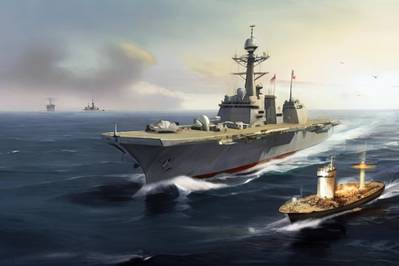Navigating the Future: Emerging Trends in Naval Operations
The global naval landscape is undergoing significant transformations driven by technological advancements, geopolitical shifts, and evolving security challenges. Naval forces worldwide are adapting to new trends that are reshaping the way they operate, ensuring readiness in an era of rapid change. This article explores the emerging trends in naval operations that are influencing the strategies and capabilities of naval forces across the globe.
Technological Innovation:One of the prominent trends in naval operations is the integration of cutting-edge technologies. Naval forces are investing in artificial intelligence, autonomous systems, and advanced sensors to enhance situational awareness and decision-making capabilities. Unmanned maritime systems, including autonomous underwater vehicles (AUVs) and unmanned surface vessels (USVs), are being employed for tasks such as mine countermeasures and surveillance.
Cybersecurity in Maritime Domain:As naval operations become more dependent on digital technologies, the need for robust cybersecurity measures is paramount. Naval forces are prioritizing cybersecurity to safeguard critical systems, communications, and data from cyber threats. The maritime domain is increasingly vulnerable to cyber-attacks, making resilience and adaptability crucial components of naval cybersecurity strategies.
Adoption of Electromagnetic Warfare:Electromagnetic warfare capabilities are gaining prominence in naval strategies. Naval forces are investing in electronic warfare systems to disrupt or disable adversary communication and sensor networks. This trend reflects the growing importance of gaining a technological edge in contested maritime environments.
Focus on Unmanned and Autonomous Systems:Unmanned and autonomous systems are transforming naval operations by offering enhanced capabilities and flexibility. Naval forces are incorporating unmanned aerial vehicles (UAVs) for surveillance, reconnaissance, and intelligence gathering. Autonomous vessels are being explored for tasks such as mine clearance and patrolling, reducing human exposure to potential threats.
Renewable Energy Integration:Naval forces are increasingly exploring renewable energy solutions to reduce their environmental impact and enhance operational sustainability. Solar panels, wind turbines, and energy-efficient propulsion systems are being integrated into naval vessels to decrease dependence on traditional fuel sources. This trend aligns with global efforts to address climate change and promote greener naval operations.
Multi-Domain Operations:The concept of multi-domain operations involves the seamless integration of air, land, sea, space, and cyberspace capabilities. Naval forces are adapting to operate in a multi-domain environment, enhancing interoperability with other branches of the military. This approach enables more effective joint operations and response to complex threats across different domains.
Global Partnerships and Alliances:Naval forces are increasingly recognizing the importance of international collaboration to address common challenges. Partnerships and alliances are being forged to enhance maritime security, counter illicit activities, and respond to regional and global crises. Joint exercises and information-sharing initiatives contribute to a more cooperative and coordinated naval environment.
Conclusion: The evolving trends in naval operations underscore the dynamic nature of maritime security and the need for naval forces to adapt to emerging challenges. As technology continues to shape the future of naval warfare, the ability to integrate innovation, cybersecurity, and sustainable practices will be crucial for maintaining a secure and resilient maritime environment. Navigating these trends requires a forward-looking approach that embraces technological advancements while fostering international cooperation and strategic partnerships.







